Brian Clegg's Blog, page 123
March 20, 2013
Getting accounting right
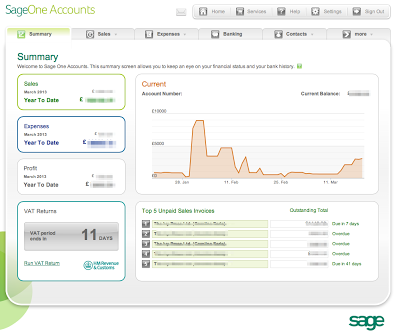 Like a lot of people running small businesses or who are self employed, I've always struggled with accounting software. Frankly it's too complicated. By far. It's designed for accountants, not human beings.
Like a lot of people running small businesses or who are self employed, I've always struggled with accounting software. Frankly it's too complicated. By far. It's designed for accountants, not human beings.When I first set up my own business I did look at the accounting software on offer, but it had two big problems. Not only would I have to get a finance degree to understand it, frankly it was from the dark ages. I have always provided invoices electronically, first to computing magazines, who not surprisingly were early adopters, and more recently to pretty well everyone. Yet the accounting packages I looked at insisted on working on paper. Groan.
So I wrote my own system in Microsoft's Access database. It did the job, and was very much tailored to my business, but it got creaky over the years, not helped by the fact that I never successfully managed to update it for more recent versions of Access, so I had to keep a copy of a circa 1997 version around to make my accounts work.
Somewhat over a year ago I decided enough was enough and hoped against hope that accounting software had moved on. The good news was all the packages now handled electronic invoices... but all the computer-based packages still required membership of the Freemasons and a certificate in accounting terminology to be able to use them. To make matters worse, I knew I was going to cut my main computer over to a Mac fairly soon, and not all the packages ran on that.
My saviour, bizarrely, was one of the crustiest of the old guard, Sage. I did take a look at their PC-based software, but it is still a mega dinosaur. However they had just brought out Sage One, which is a web-based package, and I confess I love it. I've been using it about 18 months. It does all I need, but in an accessible way (if your accounts are even simpler than mine, they have a really basic 'cashbook' version too). I can access it wherever I am - and my accountant can dig into it direct and furkle around with all those accountanty things they do with one trouser leg rolled up. It even does VAT returns if you suffer those.
Like anything doing a biggish job it takes a little while to get into, but I am now on top of my accounts in a way I never was before and it takes very little time. I pay £10+VAT a month for it, but the accountant assures me that their bill for doing my annual return will drop by more than £120 as a result of them having access to it - so it pays for itself.
It's not perfect. There could be a much wider range of reports, for instance, and as yet the VAT side needs a bit of manual assistance of you do anything complicated like buy something from outside the UK. But it really has made doing the accounts, dare I say it, almost fun. Now that is worrying.
You can find out more about Sage One at this website - and there's a month's free trial, which is what I did, to see if it works for you...
Published on March 20, 2013 01:44
March 19, 2013
Revenue management for a new century
 There are some businesses that have an unusual problem. They sell commodities that have a value up to a certain point in time, but that value drops to zero after that moment. A classic example is an airline's inventory. The value of an airline seat drops to zero at the moment the check-in closes. The realization of this simple fact changed the way airlines sold seats in the 1980s and 1990s, pumping up revenue significantly. How does this knowledge make you money? Because with the right systems, as time runs out, you can sell off the seat that won't go at full price much cheaper and provided you cover the incremental costs of carrying the passenger, then you are still making extra profit.
There are some businesses that have an unusual problem. They sell commodities that have a value up to a certain point in time, but that value drops to zero after that moment. A classic example is an airline's inventory. The value of an airline seat drops to zero at the moment the check-in closes. The realization of this simple fact changed the way airlines sold seats in the 1980s and 1990s, pumping up revenue significantly. How does this knowledge make you money? Because with the right systems, as time runs out, you can sell off the seat that won't go at full price much cheaper and provided you cover the incremental costs of carrying the passenger, then you are still making extra profit.I bring this up, because it struck me there was a new, more interesting possibility that could easily be made available to push up profits even further. I was buying a railway ticket online and, as you can see, the system generously offered to bump me up to first class for a suitable extra bit of cash. Now here's the interesting bit. I am too tight to pay what it was asking - but I would have paid something extra to get a first class seat. The chances are that the train will travel with lots of empty first class seats. They usually do. So why not let the customer say what they would pay for an upgrade. Let's say I was prepared to pay £7. With a suitable algorithm, the system could decide whether or not to accept my offer. If it did, the the rail company would still benefit. And I'd be happy too. Win-win.
In principle a haggling system could also be applied to buying a seat in the first place, but it could be brought in painlessly by starting with upgrades, a situation where you already have the customer and it's just a matter of seeing how much you can get out of them. But remember this isn't a case of the nasty company squeezing the customer for every last penny - because the customer benefits too, getting something they would like at a cheaper price. As a customer I want haggling.
It's interesting that it is only now, decades after computer booking systems were introduced, that they are getting clever enough to cope with that oldest of human negotiating tools, haggling. I think the technology could be made to work now. It's just a matter of a company having the guts to give it a try.
Published on March 19, 2013 01:36
March 18, 2013
League table lottery
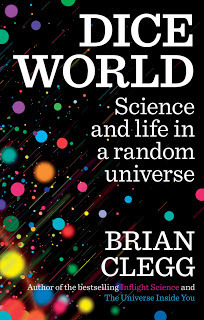 It's not exactly news that school league tables have their problems, but I have rarely seen a better example of 'Lies, damned lies and statistics' at work than in the recently published secondary school league tables. Two observations I made - there was not a single school in Swindon in the comprehensives top 100, and my old school, Manchester Grammar School only came 65th in the independent schools.
It's not exactly news that school league tables have their problems, but I have rarely seen a better example of 'Lies, damned lies and statistics' at work than in the recently published secondary school league tables. Two observations I made - there was not a single school in Swindon in the comprehensives top 100, and my old school, Manchester Grammar School only came 65th in the independent schools. Now the facts are that there are some very good comprehensives in Swindon, and that MGS is without doubt one of the top handful of independent schools in the country. So what went wrong?
In Dice World , my new book on randomness and probability, out next month, I point out that we are very good at reading meanings into numbers that just aren't there. In the case of these tables there is a totally bizarre assumption being made that the average number of points achieved at A level is somehow the same thing as relative merit of the school. But why would it be? I don't if it is still true but when I was at secondary school we were discouraged from doing too many A levels for the sake of it. It was considered more important to focus on the right things, to get the minimum required A levels for your course and the spend the rest of the time getting more rounded education. That's just one of many factors that could influence average A level scores adversely.
Should we have league tables like this at all? I'm not sure. But if we do, I am convinced that the measure used needs to be better thought through. For example it would be much more interesting to know how many university offers (perhaps graded by university, though that's another can of worms) were made to the students, rather than totalling up grades alone. That way you could include how well the school prepared them for interviews as well as crude exam passes.
There has to be a better way...
If you're on Facebook and want to be kept up to date on Dice World, just like its page:
Published on March 18, 2013 02:12
March 15, 2013
Cardboard is so passé
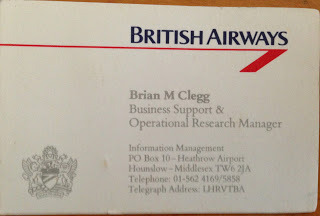 Here's a card I had (much) earlier...Business cards are very useful things, even if you have to be a little careful with your etiquette when handing out and receiving them in the Far East. But in some ways they are a bit of a pain - because they don't naturally interface to our electronic world.
Here's a card I had (much) earlier...Business cards are very useful things, even if you have to be a little careful with your etiquette when handing out and receiving them in the Far East. But in some ways they are a bit of a pain - because they don't naturally interface to our electronic world.For many years I have been typing the information from business cards into my computer and then discarding them. (See what I did there? Discarding.) But that, frankly, is tedious and there should be something better when we walk around with camera-loaded smartphones. Sure enough, there is - but in a strangely hybrid fashion.
There have been scanners, and more recently apps for your phone to do OCR and automatically read the text on them, for a while, but they have always been a bit hit and miss, particularly as the formats of business cards can be wild and wonderful. But I've just put an app on my phone that is as close to perfect as you can get. You have to be a member of Linkedin to use it - but apart from that small effort (no effort in my case as I was already a member), it's free.
Called Cardmunch it's starts off with the usual approach of taking a picture of the business card with your phone's camera - but then the aforementioned hybrid mode kicks in. Rather than use dodgy OCR it ships the image off to a real person, who reads the card and types in the information. Okay, it's not quite as instant as OCR, though when I tried it, the data was available in about five minutes. And the person on the other end can make a mistake - but all the evidence is that this approach is significantly more reliable than even the best scanner software.
Once you get the thumbs up, you can optionally send a link request (if the person is on Linkedin) with a single touch, and similarly it just takes a couple of touches to get the person's details into the address book on your phone (and if it's linked like mine, your computer as well). Business card to electronic contact with about 10 seconds of effort. Can't be bad.
Published on March 15, 2013 02:42
March 14, 2013
Getting Siri-ous
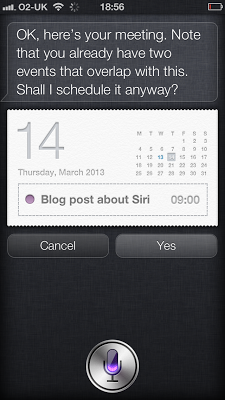 When I first got an iPhone that supported the Siri voice-controlled assistant, I thought it was a bit of a gimmick. I did the usual stuff of asking it 'What is the answer to the ultimate question of life, the universe and everything?' and other silly questions. And then for a long time I didn't touch it. Which was a shame, because I have discovered it is really useful.
When I first got an iPhone that supported the Siri voice-controlled assistant, I thought it was a bit of a gimmick. I did the usual stuff of asking it 'What is the answer to the ultimate question of life, the universe and everything?' and other silly questions. And then for a long time I didn't touch it. Which was a shame, because I have discovered it is really useful.The thing is that I often think of something I need to do or remember while I'm out walking. It's one of the reasons I like walking the dog or going to the post office - I get my best ideas in the process. The natural thing to do is to stick something in my diary, or make a note... but it's a bit slow and fiddly on the move, especially if you've only one hand free. With Siri it's a piece of cake. In fact for quite a lot of entries, like the one I made to demonstrate the feature for this blog post, it's quicker to use Siri than it is to do it by hand, even if you are sitting at your desk.
What I said to Siri was 'Schedule tomorrow 9am blog post about Siri.' It came back with the response you see in the photo, offering me the meeting and pointing out I already had something in my diary at that time. All I had to do was press or say 'Yes' and the item was in my diary.
Of course like any voice recognition there are some words it will struggle with. But it's not bad at all, and for this kind of thing it really is very impressive. You can also do things like call someone or text them, find out where you are, get a route to a location and all sorts of other things, just by talking. I was truly sceptical, but with a little practice I wouldn't be without it.
Published on March 14, 2013 01:36
March 13, 2013
Cheque mate
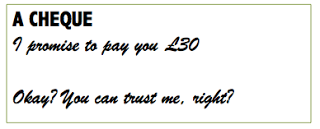 Business is rather dependent on the flow of cash, moving easily from place to place. Self evident truth. And none more so than with a self employed business, like an author.* So why do some businesses make it so hard to enable that cash to do the rounds?
Business is rather dependent on the flow of cash, moving easily from place to place. Self evident truth. And none more so than with a self employed business, like an author.* So why do some businesses make it so hard to enable that cash to do the rounds?Once upon a time, customers would have had to turn up with a literal bag of cash (or possibly a chicken to barter with). This isn't very convenient. I've never seen face-to-face many of the people who pay me money. They insist on living in inconvenient places like London and New York. So someone had the clever idea of writing a promissory note that would be accepted by a bank as evidence of the wish to transfer virtual cash. A cheque. (Sorry, US folks, this is one case where your Ben Franklin et al simplified spelling goes horribly wrong. Calling it a 'check' doesn't work, because 'check' already means something else.) This could just be slipped in the post. Simples.
However, just as vinyl was replaced by CDs, themselves now being replaced by downloads, so the cheques that replaced cash are themselves being ousted by electronic funds transfer (usually in the form of BACS in the UK). And it's brilliant. It is genuinely win-win.
Using the cheque model, I have to wait for the cheque to come through the post, I have to make the effort to visit the bank to pay it in, I have to wait 3 working days for it to clear. And the bank kindly charges me 70p for the privilege of accepting it. By contrast, a BACS payment involves me doing nothing, can happen instantly, and isn't charged for by my bank. (Some banks do, I know.) The only downside from my viewpoint is that some customers are rather sloppy about sending out an electronic remittance advice to accompany the payment, so it's not always entirely obvious what a payment is for.
Surely, though, it's worse for the company making the payment? No, no, and thrice no. They too have lower costs by using electronic payments. Their bank will charge them for each cheque they write, but may not charge for paying this way. The company has to produce the paperwork to accompany the cheque and to post the whole thing. They have to get a director or someone else important to append their pretty signature. There's the cost of postage and of the admin effort required. Okay, the one advantage of the cheque is for their cashflow - they get to hold onto their money a few days longer - but with interest rates what they are, this is no great benefit.
So why, I ask, why is that a couple of the publishers I deal with insist on still using cheques? Come on, guys, get with the trend. I'm surprised they aren't offering chickens.
* Aside rant: I was furious to hear some US academic economist type on the news yesterday, who was criticizing the UK's claim to have falling unemployment. He said something to the effect of 'Yes, but these aren't real jobs, they're mostly self employed or low pay.' I'm sorry? Being self employed isn't having a real job? I've been self-employed now for around 19 years, merrily paying tax, buying goods and not being a burden on the state. Could you explain to me Mr Overpaid and Unnecessary Economist (because, let's face it, being an economist isn't exactly real employment) in what sense mine is not a real job? Grrr.
Published on March 13, 2013 02:27
March 12, 2013
The mysterious case of the disappearing author
 Where's Sherlock Holmes when you need him? For I have become aware of a case that I am sure he would regard as a three pipe problem. Consider this, dear reader, consider this.
Where's Sherlock Holmes when you need him? For I have become aware of a case that I am sure he would regard as a three pipe problem. Consider this, dear reader, consider this.Facebook allows you to set up closed or 'private' groups - handy to hang out with friends for a chat about work or whatever you like. I belong to one with a number of online friends, and like all such groups, joining is by invitation - you can't see any details from the outside.
Yesterday one of the members was contacted on Facebook, by someone called Laurindo Jones, asking about the group by name. He seemed to have joined Facebook for the sole purpose, as he had only signed up 1 hour before. Around five others in the same group got friend requests from him within a matter of hours... then, as one of them was trying to find out more about 'Laurindo', the Facebook account was suddenly deleted. Most scarily of all, one of us got an email from him to a personal email address not connected to Facebook in any way.
Do a web search for Laurindo Jones and it seems he was an author of sorts. He has a profile on Amazon.com and did have a book listed on Amazon, Barnes & Noble etc. Only that has disappeared now too from all the online bookstores.
So what do we know about 'Laurindo'? According to his profile he is an American college student who wrote an erotic novel, allegedly partly based on his experiences. He comments 'Naturally "Laurindo Jones," is a pen name -- going to school fulltime and working is hard enough, without having to put up with a bunch of college girls curious to find out certain things about me.' Is he an author? Well: 'Whether my life now will lead to another book in the future, at this time I just don't know. That really depends on whether or not this one sells enough copies to make another worthwhile.'... Only 'this one' is hardly going to sell many copies now it has ceased to be available.
Thanks to the wonders of Google cache, we can discover that his book, My Totally Crazy Love Life appears to be a classic bit of teen wish fulfilment, and that it was published by 'Story Scene Press' who allegedly operate from storyscenepress.com which, guess what... has disappeared too. Yet the book was around from 2011, so unlike the Facebook membership, it doesn't seem to have been set up purely as an infiltration move.
So there were have it. A mysterious possible writer who had an unhealthy interest in members of a group he shouldn't particular know exists, then disappeared off the face of the Earth.
Will the mystery ever be solved? I don't know. But if you know Laurindo, drop me an email at brian@brianclegg.net - and if you are enjoying the mystery, I'll update this post with any further developments...
Published on March 12, 2013 03:10
March 11, 2013
I have a little theory
 As editor of the www.popularscience.co.uk website I get a lot of requests to review books. And generally speaking, as long it's a book on a vaguely interesting subject (as opposed to The Impact of Victorian Mill Buildings on the Lifecycle of the Lesser Spotted Tit Warbler) and from a respectable publisher, I am very happy to add a book to the review pile. Things are, however, a little more fuzzy when it comes to self-published books. My default response is 'No, thanks,' but I will make an exception if it's a really intriguing sounding book, or one that could well have been published by a serious publisher. If I didn't have some kind of filter, we would be inundated with self-published detritus as well as the occasional gem, and I simply don't have the person power to wade through, sieving for gold.
As editor of the www.popularscience.co.uk website I get a lot of requests to review books. And generally speaking, as long it's a book on a vaguely interesting subject (as opposed to The Impact of Victorian Mill Buildings on the Lifecycle of the Lesser Spotted Tit Warbler) and from a respectable publisher, I am very happy to add a book to the review pile. Things are, however, a little more fuzzy when it comes to self-published books. My default response is 'No, thanks,' but I will make an exception if it's a really intriguing sounding book, or one that could well have been published by a serious publisher. If I didn't have some kind of filter, we would be inundated with self-published detritus as well as the occasional gem, and I simply don't have the person power to wade through, sieving for gold.I'd like to briefly contrast two self-published books I have reviewed, one of which went down very well, and the other that didn't to show what is needed for a self-pub to succeed in this field.
 The high flyer was a little number entitled
The Rocketbelt Caper
. We are happy to cover technology if it's interesting - and this was interesting in spades. It had a topic that anyone brought up on Tomorrow's World and James Bond would love - the development of the jetpack or rocketbelt - it was professionally told, and kept the reader interested throughout. It was no surprise to me that this book was picked up by a mainstream publisher, so is no longer self-published... but it was when we first reviewed it.
The high flyer was a little number entitled
The Rocketbelt Caper
. We are happy to cover technology if it's interesting - and this was interesting in spades. It had a topic that anyone brought up on Tomorrow's World and James Bond would love - the development of the jetpack or rocketbelt - it was professionally told, and kept the reader interested throughout. It was no surprise to me that this book was picked up by a mainstream publisher, so is no longer self-published... but it was when we first reviewed it.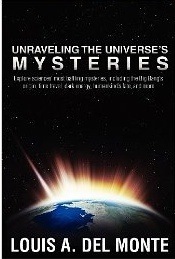 Less successful was the recently received
Unraveling the Universe's Mysteries
. This couldn't be faulted on the professionalism of its publicity machine, but left something to be desired as a book. I had let it through the sieve because the author had an appropriate background (physics degree/worked for IBM) and seemed from the blurb to be going for a straightforward explanation of science rather than pushing his own theories, but it wasn't a great read. It wasn't well edited (string theory, for example, became both sting theory and spring theory in the space of a couple of pages), the author didn't have that professional writing touch and there was at least one hiccup with the science. Now don't get me wrong, practically every popular science book I've read (including mine) has had more than one error - but it's a matter of proportion.
Less successful was the recently received
Unraveling the Universe's Mysteries
. This couldn't be faulted on the professionalism of its publicity machine, but left something to be desired as a book. I had let it through the sieve because the author had an appropriate background (physics degree/worked for IBM) and seemed from the blurb to be going for a straightforward explanation of science rather than pushing his own theories, but it wasn't a great read. It wasn't well edited (string theory, for example, became both sting theory and spring theory in the space of a couple of pages), the author didn't have that professional writing touch and there was at least one hiccup with the science. Now don't get me wrong, practically every popular science book I've read (including mine) has had more than one error - but it's a matter of proportion.However the thing I was most uncomfortable with, and hence probably shouldn't have accepted the book for review in the first place, is that after a fair amount on current theories, the author started to give us some theories of his own. This is something that is usually an instant turn-off in self published books. That might seem unfair, but if, say, a leading theoretical physicist at a well-known university comes out with a speculative theory they have two advantages. First they have the knowledge to come up with a theory that could be meaningful, and secondly other people with similar expertise will have looked at that theory and commented on it. And both of those are necessary.
The fact is I'm not a physicist. I am a science writer with a rusty physics degree - not at all the same thing. And that means I really can't judge if a theory has any merit (I can tell if some are total fruit-loopery, but that's a different thing). I therefore feel uncomfortable recommending a self-published book by someone who isn't an academic working in the subject (the author of Unraveling isn't either) that comes up with original theories. The ideas in this book are certainly not totally off the wall - but they still make me feel uncomfortable.
So there we have it. It might seem unfair, but if it's self-published it mostly doesn't make the grade, and one real turn-off is going to be if the author has his or her own little theory...
Published on March 11, 2013 01:50
March 8, 2013
Don't talk to me about gamification
 A recent piece on the BBC's news website has left by stunned by the number of ways it managed to irritate me. How did it irritate me? Let me count the ways:
A recent piece on the BBC's news website has left by stunned by the number of ways it managed to irritate me. How did it irritate me? Let me count the ways:The title tells us that Fun and games 'can save the planet' - I'm already cringing. It is clear to anyone with half a brain cell that fun and games cannot undo the environmental mess we're in, and as I keep saying to the point of being boring, there is no question of saving the planet. The planet is not at risk. It can shrug off anything we can do to it in a few million years - no time at all for something 4.5 billion years old. What we are concerned with is saving human civilisation.In then tells us that A project has been launched to see whether games can help increase people's interest in environmental issues. - whoopie do. I'm thrilled. It sounds like the sort of study that may well come back with the answer 'Yes' after its 12 month period. But if it does, it will be a matter of folly, because I can guarantee you that games won't change the world. And there's quite a disconnect between increasing interest in environmental issues and 'saving the planet' (sic).Apparently the idea is to make use of 'gamification' which is 'using the concepts and and mechanics of games but in a non-gaming environment' as we are informed by 'consultant' Paula Owen. Pardon me while I barf. 'Gamification?' Leaving aside a word that clearly should be pronounced gam-ification, this is a mind bogglingly inane concept.The gamification (groan) aspect will be to enhance engagement with those who have not engaged with environmental issues in the past because it had "all been a bit guilt-filled and full of doom and gloom". Give me strength. So by putting gaming style activities into the workplace, say, we are supposed to find that those who find the environment a depressing topic will suddenly realise it is fun. Yes, well, don't hold your breath Dr Owen.To make things even more fun (could they be?) the idea will be to use actual games with an environmental flavour such as Play Your Eco-Cards Right and Eco-Snakes and Ladders. That'll do the trick.Of course this kind of thing is easy to mock. I just have. In a sense there's a sort of logic behind it - people might engage more with the environment if things are presented in a fun way. This logic is called 'lowest common denominator' or 'dumbing down.' This is an approach that works quite well with junior school children, but is treated somewhat cynically by many secondary school children and really is not the right way to go with adults. Unless you are Channel 5 News.
Frankly, the reason those unengaged people find it 'all a bit guilt filled and full of doom and gloom' is that this is a fair picture if you are going to be honest, rather than come across all Pollyanna. We do feel guilty, both because each of is in a small way responsible, and also because individually we can do very little. We should, frankly, be extremely worried, if not full of doom and gloom, and inspired to get things happening on a large scale. But to think that trivializing the issue and making it 'fun' can somehow change anything is naive in the extreme. And no doubt is using up taxpayers' money that could be spent more usefully.
This has been a green heretic production.
Published on March 08, 2013 00:54
March 7, 2013
In praise of the walled garden
 I recently read these comments from someone who works in a computer support department about a hapless computer user:
I recently read these comments from someone who works in a computer support department about a hapless computer user:Unfortunately I've dealt with enough of these types of customer service issues to know with almost abolute [sic] certainty, that the customer in question here is your typical ignorant arsehole.
He will have been the kind who in general doesn't listen to simple instructions, has no clue how to operate a computer, and will have installed a million browser toolbars, 6 unintended antivirus programs, and every peice [sic] of crapware available on the internet within minutes of plugging the dam [sic] thing in.
He then phones some poor hapless call centre support bod, and shouts for fifteen minutes demanding a brand new computer.
This all too typical genus [sic] is incapable of learning, because he/she refuses to accept just how useless they are at using a computer (never actually reading a message that pops up on the screen before clicking wildly in the hope of getting a new screensaver), and therefore makes the call centre bod's extremely difficult job simply impossible.Now, as it happens I have run the PC support department of a large company and it is certainly true that you do get some difficult customers. But even so, I think the support guy here has got matters back to front (and has some problems operating a computer himself, given the number of spelling errors). What he is describing is not a fault with the user, but with the computer. Why should a customer know all the ins and outs of computer maintenance? He shouldn't have to.
One of the joys of having moved off a PC onto a Mac is that it is, in some ways, more restrictive. When I moved over, a friend said 'You are the last person I'd expect move into the walled garden,' because I used to program computers, so used to be good at getting my hands dirty, fiddling around at a low level. But no more. I understood DOS pretty well, but have little idea about what's going on in a modern Windows implementation. I want the protection of that wall. I don't get offered 'a million browser toolbars' and '6 unintended antivirus programs.' And I would argue it would be better still if it was even more of a walled garden. Yes, this means you are limited in the bells and whistles a fanboi can bolt onto their operating system. But 99.999% of users just want to get on with the thing and use it, not be constantly fiddling around with it.
Compare it with another really complex bit of technology many of us own, a car. On the whole, unless you are one of those odd custom car people, you buy a car and you use it. You don't keep upgrading the operating system (I assume it has one somewhere) or downloading extra bits of software to the CD player so it can tell you the time in Hong Kong as you drive. I'm not saying that a computer should be as limited as a car - it is a more flexible tool which requires a more flexible approach. But I'd say the amount of upgrading and bolting on and adding on that is allowed is just confusing for most users. Many of us have concealed computers in, for example, PVRs and Sky boxes. They get upgrades automatically, but on the whole they just work. A 90-year-old with no experience can use them. There is no reason at all why computers shouldn't be the same. Of course you have to be able to install programs (though not browser toolbars), but in a controlled way. As for upgrades that are fixes, they should be done invisibly - anything else should be kept to a minimum. Fine, have an unlock control in the system preferences that lets you do anything you like - but for the 99.99% of us who just want to use the thing, lock it down.
So I'm sorry, Mr Ignorant Support Person, the problems you describe are not because the customer is an 'ignorant arsehole' but because the computer software is 'badly designed' and doesn't offer the customers the protection they should expect when they buy a computer.
Published on March 07, 2013 00:37



